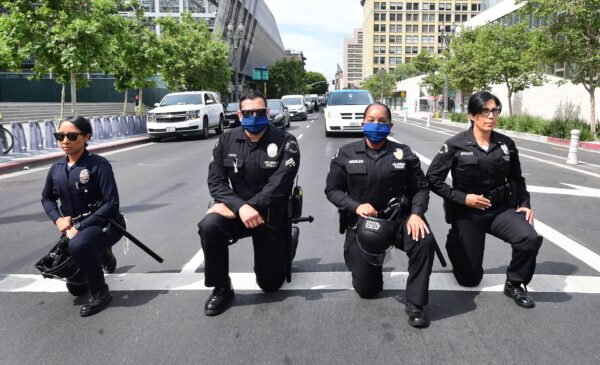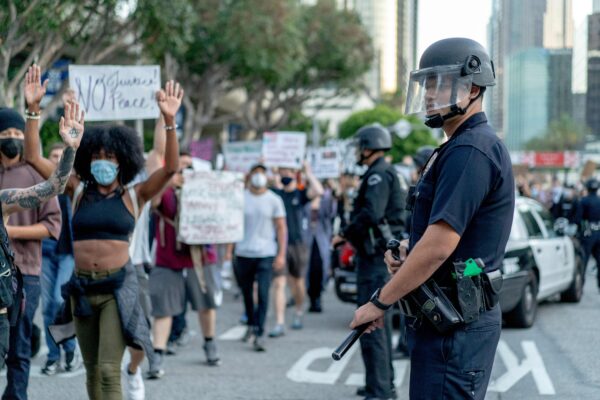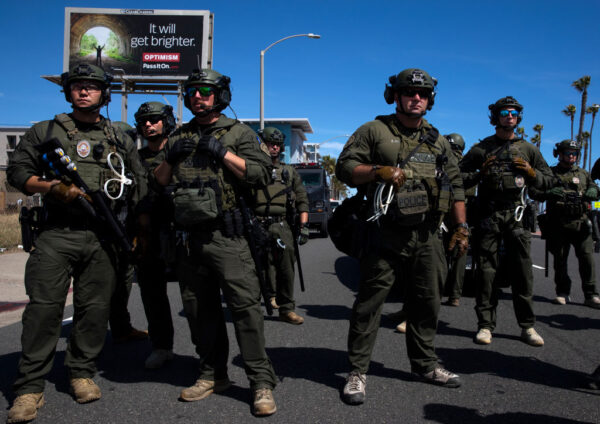ORANGE, Calif.—As protests sparked by George Floyd’s death continue in Southern California, demands for reforming and defunding the police have ramped up.
A petition on the Black Lives Matter website reads, “We call for a national defunding of police. We demand investment in our communities and the resources to ensure Black people not only survive, but thrive.”
Los Angeles is looking at a major cut to police funding, spurring pushback from the police union. In Orange County, city councils are fielding public comments about reform, and debating a course of action.
Kings County Sheriff David Robinson, who has stepped up as the new head of the California State Sheriff’s Association, encourages officers to keep their spirits up through the changes to come.
“We will always be held to a higher standard than most professions,” Robinson told The Epoch Times. “We recognize that and must embrace it.”
A ‘Stab in the Back’
Los Angeles Mayor Eric Garcetti supported a June 3 motion, proposed by city council members including council President Nury Martinez, to cut funding to the Los Angeles Police Department (LAPD) by more than $100 million.
The police union took issue with the reasoning.
“[They] basically said that the LAPD is one of the systems that’s harming our minority communities,” union head Robert Harris told The Epoch Times. “And so a lot of officers felt like that was a stab in the back, at a time when they were literally on the line trying to hold the city together.”
Harris is director of the Los Angeles Police Protective League, a labor union representing nearly 10,000 officers. The union released its own blueprint for national police reform on June 12, in collaboration with police unions in San Jose and San Francisco.

“We’ve been at this for two decades in Los Angeles, and we are decades ahead of where other agencies throughout the country are,” Harris said. “Some of the things the community [is] rightfully calling for have already been in place in Los Angeles.”
A statement released by the union on June 5 said the mayor has touted reforms in the past, “only to condemn and sanction us when it suits [his] political agenda.”
Harris said the budget cut is “a political posturing move,” and warns about the repercussions.
“Every dollar that goes to a police budget, when you remove that dollar, it will have a real, tangible impact somewhere down the line on the level and quality of service that you provide,” he said.
“It will just also trickle down to [cause] less personnel. Then, you’re looking at slower response times to 911 calls. We’re looking at a slowdown in the investigative process for violent crimes—our rapes, our murders, and our assaults.”
What Defunding Means
Joe Vargas, who spent 30 years in the Anaheim Police Department, has asked Orange County protesters in recent weeks to elaborate on what they mean when they hold signs saying “Defund the Police.”
“They really can’t say what that means,” he told The Epoch Times. “Does that mean that your sexual assault investigation is not going to be investigated? Does that mean that your burglary case is not going to be looked at?”

Vargas also is a columnist for Behind the Badge, a news site that offers commentary from law enforcement experts in Southern California.
“Police work has its shortcomings [and] its failings, but when you call 911, by and large across the country, somebody picks up the phone, and people do come out and respond, which you don’t find everywhere in the world,” he said.
“Public safety has always been the largest part of any municipal or county government’s budget,” he said. “Ensuring the safety and security of the citizens is the primary function of government. And that is why such a big expense goes into it.”
In Anaheim, 42 percent of the city’s unrestricted general fund is currently dedicated to the police department. That figure was under scrutiny at a June 9 budget session.
Anaheim’s Police Budget
The Anaheim City Council received about 100 comments asking for police funding to be reallocated to education, homelessness, affordable housing, and mental health.
“It is unconscionable that 1/3 to 1/2 of the city’s budget is going to the police department. This does not align with the values that I have as your constituent,” reads part of the email template used by the majority of the commenters.
Councilman Trevor O’Neil told The Epoch Times via email, “I will not be supporting policies that make our city less safe. I won’t be supporting policies that take police officers out of our neighborhoods and business areas.”
During the session, he had opposed withdrawing funds from the police, since across-the-board cuts will already be made as a result of pandemic budget strains.
Irvine Discusses 8 Can’t Wait
Meanwhile, Irvine’s city council held a special meeting June 9 on police conduct, with the national 8 Can’t Wait campaign a central topic. It calls for eight immediate reform measures to reduce fatal interactions with law enforcement.
According to the 8 Can’t Wait website, the Irvine Police Department satisfies three of the eight criteria.
However, Chief Mike Hamel gave a presentation illustrating how the department’s policies align with 8 Can’t Wait.
“I do believe we’ve fulfilled these eight policy issues,” Hamel said. “We had 26,023 arrests in the past five years, and of those arrests, there was a use of force in only 40 of those encounters. That’s 0.15 percent.”
The 8 Can’t Wait campaign has recently apologized for detracting from other groups aiming for more “paradigmatic shifts.” It clarified “the end goal for all of us should be absolute liberation from policing.”
Irvine Councilmember Melissa Fox told The Epoch Times, “I am in strong opposition to defunding our Irvine Police Department.”
“Not only has the Irvine Police Department made Irvine America’s Safest City for 14 years in a row, Irvine was one of only 11 major police departments in the nation that did not use deadly force from 2016–2018.”
Orange County Sheriff’s Response
The Orange County Sheriff’s Department reaffirmed its commitment to transparency and maintaining the public’s trust in a June 9 press release.
The release notes that in 2019, out of about 360,000 interactions between officers and the public, 421 resulted in the use of force. Each use of force is subject to a multilevel review.
Nine were referred to Internal Affairs as being potentially inappropriate. That’s 2 percent of all uses of force—or 0.002 percent of all public interactions—flagged as potentially inappropriate.

Effective immediately, the department has suspended the carotid control hold to evaluate “its use and effectiveness as a compliance tool.”
Vargas said he sees how the carotid hold could be an effective tool in rare cases, especially if an officer is at a physical disadvantage in a dangerous situation.
“I’m 5-foot-7, and when I was a brand new cop, I was all of 145 pounds out there,” he said. But, he added, the carotid hold is worth giving up as “a step forward in developing trust with the community.”
“We’ll adapt. We always have,” he said.
Robinson said, “People need to remember we are all human beings. As such, we will make mistakes. We have to learn from those and move forward.”